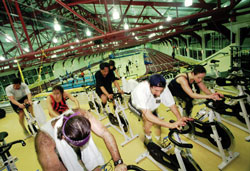Clapping for Credit: State CLE Courses Use Unusual Pairings to Stimulate Interest

Photo AP Photo/Mark Lennihan
In New York, comedian and former trial lawyer Tommy Galan teaches an improv class where participants practice responding to the unexpected. In Missouri, there’s a spinning class where cyclists can burn away calories while learning about litigation strategy. And in South Carolina, shooting and hunting enthusiasts can combine an ethics seminar with a day of skeet.
These classes all have something in common: They are state bar-approved CLE programs.
The trend toward experiential, active programs for CLE credit is unmistakable. In Utah and elsewhere, lectures are combined with golf, skiing or other playtime activities. In Illinois, for example, lawyers can earn CLE credit for a course combining exploration of a more holistic view of conflicts with yoga moves.
“Some legal education providers are getting more creative with their formats,” says Jill Eckert McCall, director of the American Bar Association Center for Continuing Legal Education. “There are a lot more CLE providers than there were 10 years ago, and so the pressure is on for them to deliver more exotic experiences.”
And for lawyers, these programs can be a welcome respite from the typical CLE experience.
“You can only go to so many panels of three lawyers and a moderator talking about the Federal Courts Jurisdiction and Venue Clarification Act of 2011 before everyone goes to sleep,” says Rex Perschbacher, the former dean of the law school at the University of California at Davis. “So legal educators are looking for new ways to attract customers and retain audience interest. Hence the new stuff.”
South Carolina appears to be leading the trend toward creative CLE programming. Attorneys there can do the work necessary to obtain a concealed weapons permit and earn CLE credit in the process, or they can learn about roller derby and the law.
University of South Carolina law professor Joel Samuels, who also is a roller derby coach, teaches a CLE course called “Layin’ Down the Law: What Roller Derby Can Teach Lawyers About Civil Procedure.” During the class, lawyers learn about the latest in civil procedure before learning about roller derby. At the end, they get to watch a bout.
Samuels says there are a number of similarities between roller derby and civil procedure. “Strategy within the roller derby pack is akin to strategy on the pace and nature of filings throughout litigation,” he says.
For lawyers, the benefits of a more experiential learning environment are somewhat obvious—these classes can potentially provide more stimulation and socialization than the typical CLE experience.
And, as Perschbacher points out, the recent generation of students and lawyers has shorter attention spans than the lawyers of decades past.
“They are easily bored and distracted,” says Perschbacher, who teaches civil procedure, ethics, and law and popular culture. “So why not try things that are different?”



